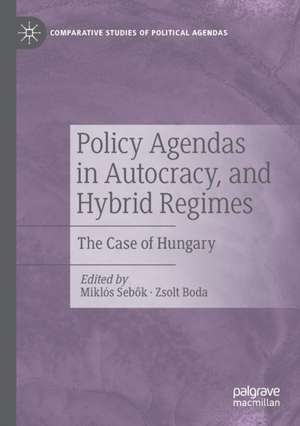Policy Agendas in Autocracy, and Hybrid Regimes: The Case of Hungary: Comparative Studies of Political Agendas
Editat de Miklós Sebők, Zsolt Bodaen Limba Engleză Paperback – 3 iun 2022
| Toate formatele și edițiile | Preț | Express |
|---|---|---|
| Paperback (1) | 890.85 lei 43-57 zile | |
| Springer International Publishing – 3 iun 2022 | 890.85 lei 43-57 zile | |
| Hardback (1) | 894.65 lei 43-57 zile | |
| Springer International Publishing – 2 iun 2021 | 894.65 lei 43-57 zile |
Preț: 890.85 lei
Preț vechi: 1086.40 lei
-18% Nou
Puncte Express: 1336
Preț estimativ în valută:
170.52€ • 185.28$ • 143.33£
170.52€ • 185.28$ • 143.33£
Carte tipărită la comandă
Livrare economică 21 aprilie-05 mai
Preluare comenzi: 021 569.72.76
Specificații
ISBN-13: 9783030732257
ISBN-10: 3030732258
Ilustrații: XXI, 313 p. 28 illus., 9 illus. in color.
Dimensiuni: 148 x 210 mm
Greutate: 0.44 kg
Ediția:1st ed. 2021
Editura: Springer International Publishing
Colecția Palgrave Macmillan
Seria Comparative Studies of Political Agendas
Locul publicării:Cham, Switzerland
ISBN-10: 3030732258
Ilustrații: XXI, 313 p. 28 illus., 9 illus. in color.
Dimensiuni: 148 x 210 mm
Greutate: 0.44 kg
Ediția:1st ed. 2021
Editura: Springer International Publishing
Colecția Palgrave Macmillan
Seria Comparative Studies of Political Agendas
Locul publicării:Cham, Switzerland
Cuprins
Part I: Introduction.- Chapter 1: Understanding agenda dynamics in non-democracies.- Part II: Theory and research strategy.- Chapter 2: The effect of political regimes on policy agendas: A theoretical framework.- Chapter 3: Hungarian regimes and their institutional characteristics.- Chapter 4: The data and methods of the Hungarian Comparative Agendas Project.- Part III. The dynamics of policy agendas in four regimes of hungarian history.- Chapter 5: The pre-war era of proto-parliamentarism (1867-1918).- Chapter 6: The traditional authoritarianism of the Interwar period (1920-1944).- Chapter 7: Agenda dynamics in Socialist autocracy (1957-1989).- Chapter 8: The policy agendas of Liberal and Illiberal Democracy (1990-2018).- Part IV: Discussion.- Chapter 9: The Effect of Regime Types on Policy Agendas in Hungary.
Notă biografică
Zsolt Boda is a Research Professor and Director General of the Centre for Social Sciences in Budapest, Hungary, as well as a part-time Professor in Political Science at ELTE University of Budapest, Hungary. His academic work focuses on the problems of governance, public policy, as well as institutional trust, its social roots, and its consequences for policy effectiveness. He is the co-leader (with Miklós Sebők) of the Hungarian Comparative Agendas Project. He is also the principal investigator of DEMOS – Democratic efficacy and the varieties of populism in Europe, a consortial H2020 project.
Miklós Sebők is a Research Professor of the Centre of Social Sciences in Budapest, Hungary, and serves as the Director of the Institute for Political Science at the Centre for Social Sciences. He is the co-leader (with Zsolt Boda) of the Hungarian Comparative Agendas Project, and Research Director of the Artificial Intelligence National Lab at CSS. His research interests include political economy and public policy and the application of text mining and machine learning methods in these fields.
Miklós Sebők is a Research Professor of the Centre of Social Sciences in Budapest, Hungary, and serves as the Director of the Institute for Political Science at the Centre for Social Sciences. He is the co-leader (with Zsolt Boda) of the Hungarian Comparative Agendas Project, and Research Director of the Artificial Intelligence National Lab at CSS. His research interests include political economy and public policy and the application of text mining and machine learning methods in these fields.
Textul de pe ultima copertă
Over the past thirty years the comparative study of policy agendas under the aegis of the Comparative Agendas Project (CAP) has become one of the fastest growing sub-fields in policy research. Yet, similarly to policy studies in general, most of the agenda-setting literature focuses on well-established democracies. This edited volume offers a ground-breaking analysis of a hitherto less examined topic in comparative politics: the dynamics of policy agendas in Socialist autocracy and in hybrid regimes. We propose that policymaking in authoritarian and illiberal regimes is different from the practices of democracies which we analyse based on a unique historical policy agendas database built by the Hungarian CAP team at the Centre for Social Sciences in Budapest. We find that punctuated equilibrium theory offers a good description of policy dynamics regardless of policy regimes, yet punctuations are more pronounced in autocratic and illiberal settings. These regime types also share a tendency towards centralization, a less efficient use of public information and a suppression of democratic participation in the policy process. This book may be of interest to scholars and students of policy studies, agenda-setting and the politics of authoritarianism.
Miklós Sebők is a Research Professor of the Centre of Social Sciences in Budapest, Hungary, and serves as the Director of the Institute for Political Science at the Centre for Social Sciences.
Zsolt Boda is a Research Professor and Director General of the Centre for Social Sciences in Budapest, Hungary, as well as a part-time Professor in Political Science at ELTE University of Budapest, Hungary.
Miklós Sebők is a Research Professor of the Centre of Social Sciences in Budapest, Hungary, and serves as the Director of the Institute for Political Science at the Centre for Social Sciences.
Zsolt Boda is a Research Professor and Director General of the Centre for Social Sciences in Budapest, Hungary, as well as a part-time Professor in Political Science at ELTE University of Budapest, Hungary.
Caracteristici
Analyses policy agendas in hybrid regimes for the first time Use machine learning and Big Data sources to analyse political and legal texts Uses 150 years of Hungarian political history as an example of how policy-making is conducted by different regime types









